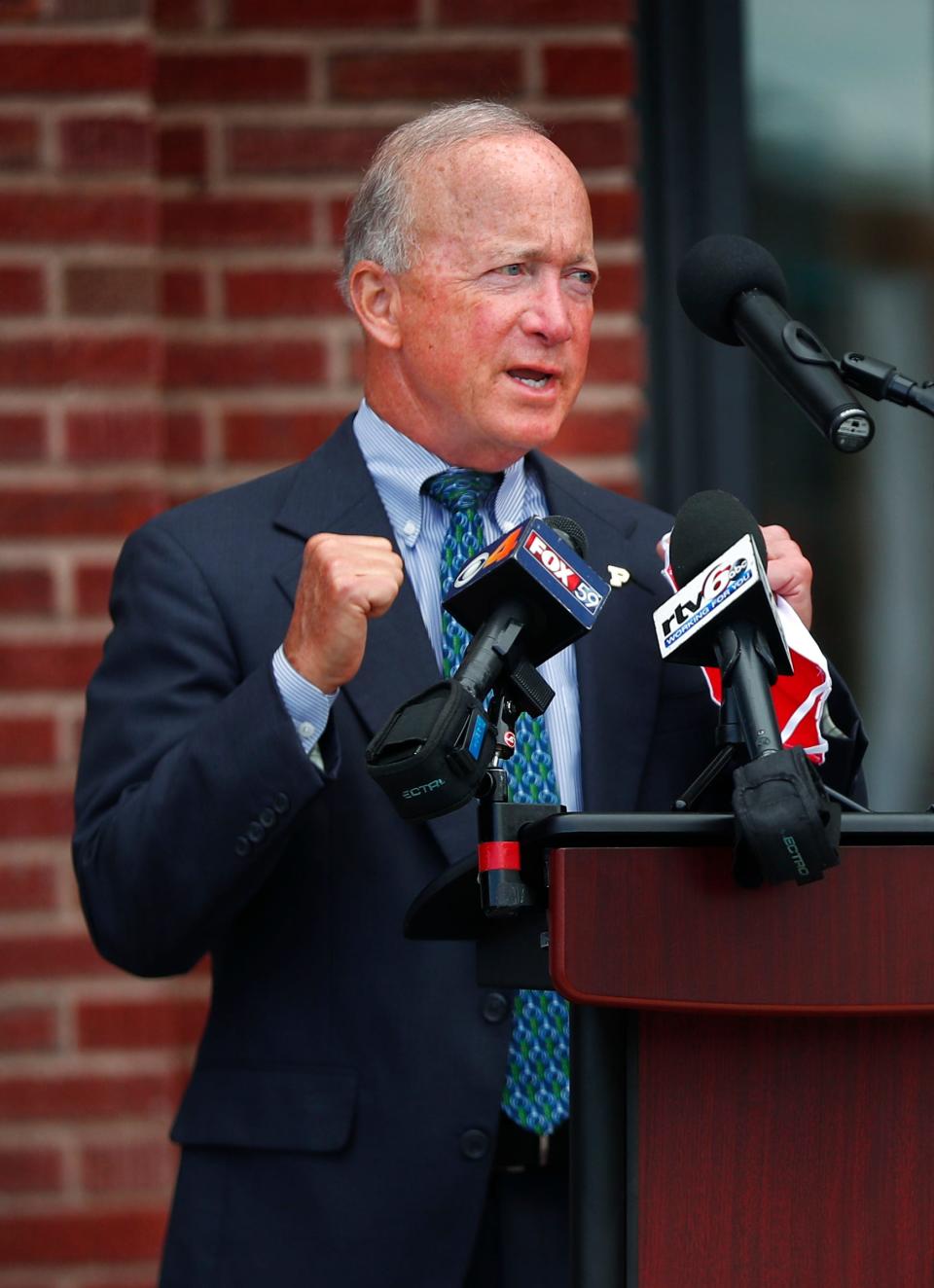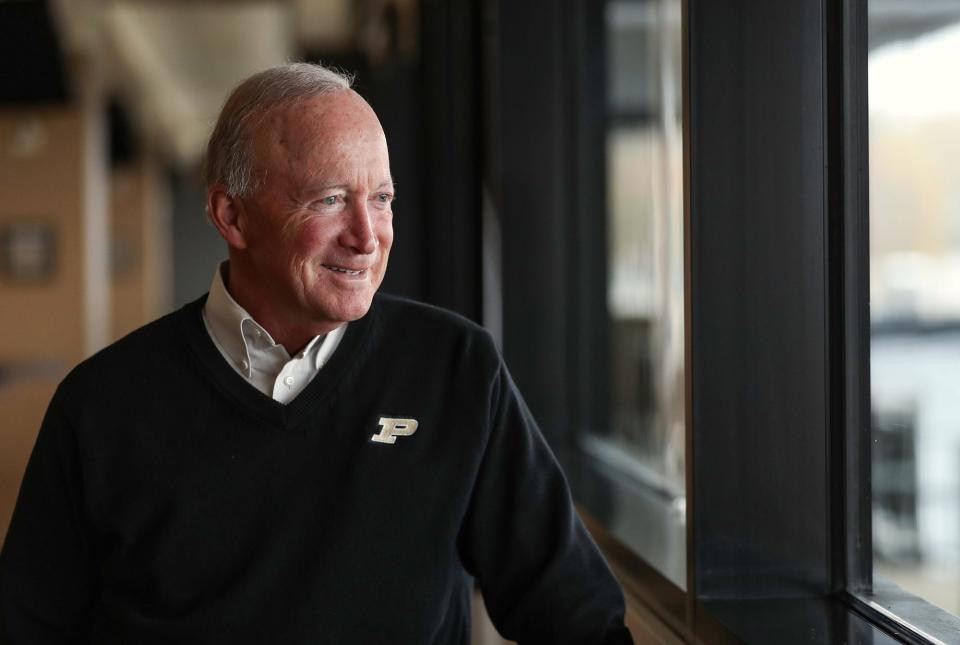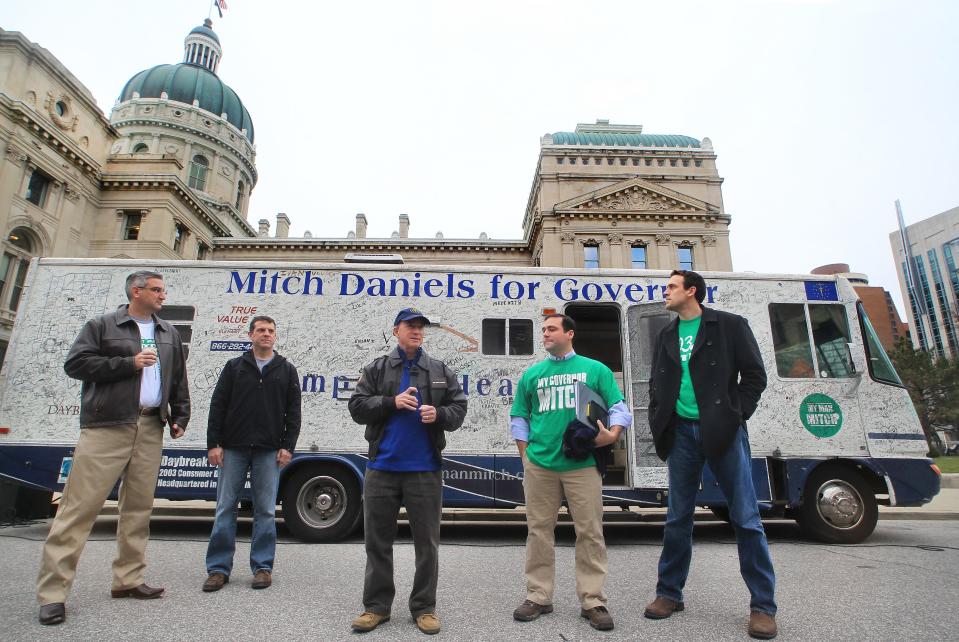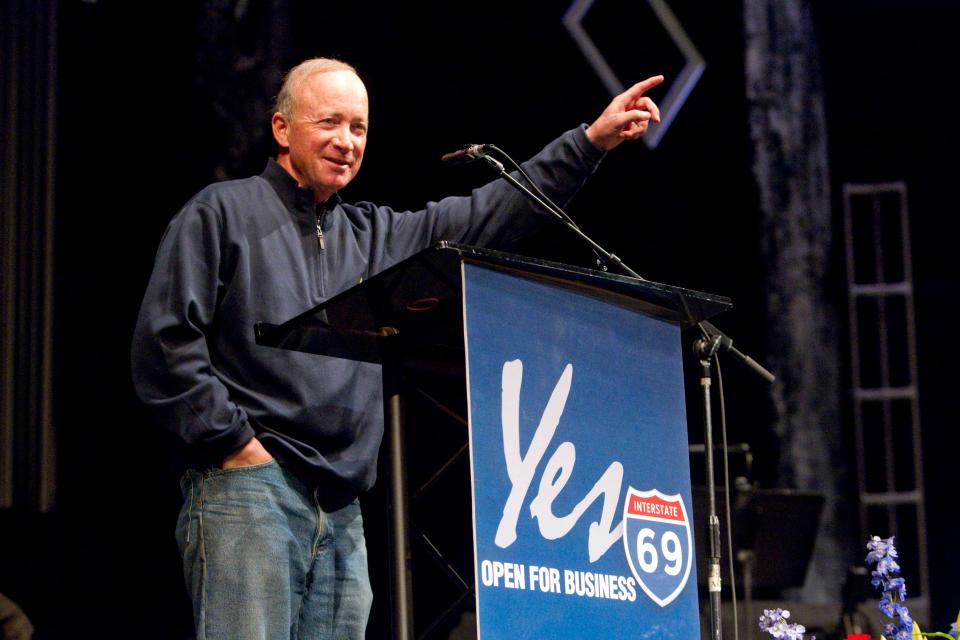Q&A: Mitch Daniels on breaking political silence, one-party rule in Indiana, and Purdue
- Oops!Something went wrong.Please try again later.
When Mitch Daniels was named president of Purdue University in 2012, the two-term Indiana governor famously vowed to "recuse himself from any partisan political activities or commentary."
Eleven years later Daniels, who retired from Purdue in 2022, broke that silence by endorsing Jefferson Shreve for Indianapolis mayor in a letter mailed to voters on Oct. 30. After retiring, Daniels briefly considered a 2024 Senate bid and has since landed an advisory gig at the Liberty Fund, a Carmel-based private education foundation.
In a new book published Nov. 1, Daniels discusses his "vow of political celibacy" in an introduction to the anthology of speeches, interviews and national newspaper columns he wrote during his decade as Purdue president.
Daniels sat down with IndyStar to talk about what that vow excluded, the state of politics today and whether he might play any part in it. This interview has been edited for length and clarity.
On partisan silence: What Daniels said and wouldn't say
Question: You've managed to be able to talk about political topics (such as the national debt, growth in "entitlement" programs, deep divisions in our society and the "shocking" outcome of the 2016 election) without veering into partisanship, right?
Answer: That's why the word 'partisan' is an important distinction. I mean, there's a bunch about what now people call civility ― the way politics ought to be approached, whatever your viewpoint is. ... It's just that I was very careful. I probably turned down literally a couple hundred interviews to come on and talk about this election or that candidacy.
Q: How about since you left Purdue? Have the requests been rolling in?
A: Sure. You know, I'm still pretty celibate. ... I took that posture back in 2012 and maintained it because that was the only right thing to do. It turned out over time to be a comfortable thing to do because as things got uglier and uglier, people in your job would say, anybody would say, 'Oh my gosh, did you see what Trump just said or what Pelosi just did?' And I could say, 'Well, of course I have my views, but it just wouldn't be appropriate.' I told my friends, it's a really good time to be a political eunuch.

Q: Do you feel that's still true?
A: Yeah, honestly, frankly, there's not much I could say about the current state of affairs that hadn't been said a lot of times, or at least about the candidates. Nobody needs to hear from me on them. You know, I still have views about our country, the shape we're in, where we're headed, but that's different.
Q: Were there ever times, though, that you thought, 'Oh I wish I could say something about that,' or any tempting moments?
A: Uh, no. (Laughs.) I didn't have anything to say that others weren't already, so I didn't think the world needed to hear from me about all that. Occasionally, maybe Purdue students did. If anything ― maybe this is something I should feel bad about ― if anything, I was happy to be totally absorbed in things that weren't political. ... As I've always said, if you're fortunate enough to end something on a high note, that's really what you want. I felt that that happened, actually, both the last two jobs. So that keeps you from regretting things or being rueful that you can't go back to them. Not to say I wouldn't ever pop off again or try to participate in some way, but it's not something I'm yearning to do.
On the state of discourse, running for office again
Q: You dwell a lot in your speeches on tribalism and social divisions ― what do you think about the state of discourse now?
A: Well it's no better. I hope it will get better because I think people are more and more weary of it, more and more aware of the dangers that it represents. And so maybe it's something that we will get past and get out of our system, but I think it would be naive to say that we've somehow grown out of it already.
Q: How much of that played into your decision not to run for Senate?
A: I had a look at the job and just decided it wasn't the job I wanted. A lot of people I admire were after me to do it; I never had thought it was something I wanted to do. But I thought, well I better at least think about. I went down to Washington, made a little field trip, went to see seven current members ― and they were in both parties, by the way. Every one of them said 'Oh yeah, you should do it, we need people like you,' that sort of thing. I said 'Thanks, but my questions are' ― and I named three or four things that bothered me about the country ― 'What are the chances that any first-term ― and in my case, probably one-term ― senator could make a substantial difference?' And they'd all say things like, 'Oh, well, you know, you'd have a great platform.' I said, 'Well I don't really need to see myself on television anymore.' ... It's not the job for me, it's not the town for me, and it's not the kind of life I want to live right now. It was all about that. ... I didn't have any doubt we could win the election, but I would've wound up spending eight years on things that I thought had very little likelihood of being productive.
Q: What were those three or four things bothering you?
A: Start with the national debt, and as part of that, saving the safety net before we start having to renege on promises we made to people. Immigration and having a sensible policy that brings in the talent America needs without opening the gates to people who are likely to be dependents or worse. And then China and our international security problems. Those are the top three, although I give the first one double, triple weight.

Q: Have you closed the door on running for any higher office?
A: Yeah. Pretty mu- Let me just say, I think the door closed. I keep saying, I think I'm past my sell-by date. (Laughs.)
Q: Are you talking age or your kind of politics?
A: The former, generally. But as I explained, at least (in) the Senate, it's just not a job where I saw a good chance of moving substantial amounts of dirt in a constructive direction.
Q: Do you see a way out or through the hyperpartisanship in our politics today?
A: Yeah, in theory, someone could emerge and say enough. ... That's one way. More and more, I'm preoccupied that, for one reason or another, we might just have to go through a real ringer nationally. Those happen in history. ... I wrote a book 12 years ago, it was full of optimism: 'We can solve this, we can make grown up decisions. You got to face up to the fact we can't keep the promises we've made. We got to make sure we keep them to the people who are most vulnerable. And if we get started now,' and all that sort of thing. We didn't get started now. Then we had presidents of both parties who made it worse. And now we're on our third one who's promising to make it worse. I've sort of gone through the stages of, 'We can definitely fix this,' to 'We can limit the damage,' to 'It's gonna be really difficult, we got to do the best we can,' and now I've sort of got to the point where if we have to really have a crunch of some kind in order to deal with it, maybe that's what we might as well get on with.
On Purdue and lessons learned
Q: You wanted your STEM students at Purdue to be grounded in history and a liberal arts framework. Why is that important to you?
A: Yeah, well, because I think it's important to them. What would be most valuable, first of all, to the students and then to the society we're preparing them for? I think it's one of the problems we have. It's not the fault of young people, but most of them have not been taught much history. Sometimes they've been mis-taught history in my opinion. Very few of them have read a lot of great literature. There's two things wrong with that: they've missed a lot or haven't thought in a broad enough way ― about what kind of person they ought to be or how societies ought to be. The second thing is, it means they can't write very well.
Q: You also encourage graduates to step outside their comfort zone and make friends with folks outside their socioeconomic class, if you will. Why is that important?
A: I'm really stuck on that. When I ran for office, first of all, I started out a no-name, first-time candidate. I figured I'm going to have to throw myself into this thing. I did, and was in a position to hit the road for 16 months, do virtually nothing else every day. In addition, I had a very strong feeling that I didn't like politics as it had evolved. I used to say, you know, television and tarmacs is not a way to really get to know the job you're gonna hold. And so we went to all the places, the "nobody goes here anymore" places. We had an Indiana-built RV, we drove the wheels off. I was just solidified in the view that life had become, even then, too Balkanized, people didn't know each other, that's a formula for social discord, that's a formula for people in places being overlooked and government making mistakes and so forth. ... I was just very bothered that too many of our fellow citizens were — not because they tried to, because it happened naturally — clustering up with people too much like themselves. First of all, they were cheating themselves of a lot of interesting friendships and insight, and secondly it was contributing to this divisiveness.

Q: You started a Gallup-Purdue poll measuring how Purdue alumni are doing in their adult lives/ What did you learn from these surveys?
A: We learned that people who had been very successful ― success as Gallup wanted to define it was not just material success, but overall success, health, happiness, community engagement ― had certain kind of experiences at college when they went. One of them was, they formed a close relationship with at least one professor, somebody who became a mentor. And another was, they had engaged in some form of research, under the supervision of a knowledgeable researcher. And so we came up with five or six things you ought to try to make sure every student did. I mention those because about five or six years ago, our trustees insisted they be written into the Purdue promotional and tenure policy. ... So now at Purdue, to be promoted, in addition to showing your scholarly production and showing that you were some kind of an effective teacher, you have to make some showing that you invested personal time in students. ... The basic lesson of Gallup-Purdue was, it's not where you go, it's how you go to college. The other thing I learned from Gallup-Purdue is what a lousy college student I was, because all the stuff you should do, basically I didn't do.
On Indiana politics, the supermajority, local and state races
Q: You said in a 2017 speech, while talking about the direction our nation was heading in terms of politics and debate, you wondered if Indiana could be different. What's your assessment on that now?
A: I think we are different.
Q: How so?
A: I don't know if we're different enough, but we're pretty different. We do not have quite the level of viciousness and vitriol in our politics. Now to be honest, as happy as I was and involved as I was in the big transformation to, right now, the one-party dominance in this state... When I was trying to make big change, pass school choice and end the inheritance tax and right-to-work laws, we needed big majorities and I worked hard to get them and I was happy to have them; however, I'm not sure that's a good permanent state of affairs. Now, 30-some states have one-party dominance. This is an unprecedented thing. And I think some of it has to do with polarization, some of it has to do with the clustering. If you live in the state where your preference is in charge, I guess you think it's fine, but I'm not sure it's very healthy. For four of our eight years, we had divided government. We had a Democratic House, but it had narrow margins. We talked, they called me all kinds of names, I slipped a time or two and shot back, not too often. But over the long haul, I think competition ― I don't care if it's in business or education or politics in general ― absence of competition is not a good thing. But that's where we are headed. Now, even with that, I think Indiana has been, people have been substantially more civil with each other, more constructive, and I hope it stays that way.

Q: Are you willing to talk about your thoughts leading up to endorsing Shreve?
A: Well, the letter speaks for itself. It's all me ― can't be blamed on a ghost writer. The only thing I would add is that I thought a very long time, and just finally decided now, if people thought it might make a difference, that I should say what I thought.
Q: What about the Indiana governor's race?
A: I'm watching it with interest. (Laughs.)
Q: Are you thinking about lending your voice to that?
A: That's a long time off, so we'll see.
On the future: Endorsements, 2024, optimism
Q: The Shreve endorsement broke your pattern of silence on partisan matters. Is this breaking a pattern for good? Do you anticipate continuing to lend your voice to endorse people or talking about partisan topics?
A: You know, it's a very legit question. I certainly don't rule it out. I hear from people all the time that wanna bat these things around. If and when somebody asks, and I think I can do something useful, I might try. That wound up being the case in this mayor's race. So I could imagine doing so again, but I don't have any current plans. We'll take 'em one at a time.
Q: I'm sure folks have asked you about the presidents' race.
A: They have. (laughs)
Q: Is there a candidate or an outcome that you support? Do you have thoughts overall about how it's going?
A: I don't have anything to say about that right now.
Q: What about the tenor of the race ― how do you see that reflecting the state of our politics?
A: I've had a lot to say about this ― I don't have anything new to say about this ― I do hope that at some point we will have leadership that works at uniting people, at getting people to think about problems we all share, whatever our differences on some questions. But that's not the nature of life in these times right now.
Q: So looking at the future, are you more on the optimistic side or pessimistic side?
A: I just gave a speech last week at my own college campus (at Princeton University). They always want a title. I said, 'Struggles of an optimist.' I can't ignore these various predictions by very smart people that we're probably headed for a real turning-point moment, possibly very, very difficult. Hopefully it's not military ― although we can't rule that out at the moment. Whether it's economic or just plain political or just societal, any of these. We've sat still and made the debt situation much worse in 12 years than it even was when I was writing optimistically. To them, I said, if that's true, when that happens, it happens in society when there's some sort of cataclysmic moment. How the society responds will determine whether it succeeds or, you know, falls away....
So am I an optimist or a pessimist? I always say, you have to be an optimist, because as an operating principal, whatever job you're doing, you have to have a can-do attitude; otherwise it's self-fulfilling. I had a coach who said, 'If you say you can or you can't, you're right.' So simple. So I'm hanging onto that obstinate optimism. But you have to look reality in the face, too. So, we'll see.
Contact IndyStar state government and politics reporter Kayla Dwyer at kdwyer@indystar.com or follow her on Twitter @kayla_dwyer17.
This article originally appeared on Indianapolis Star: Former Indiana Gov. Mitch Daniels on ending his political silence: Q&A

